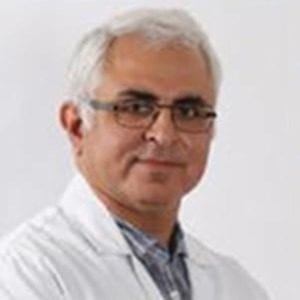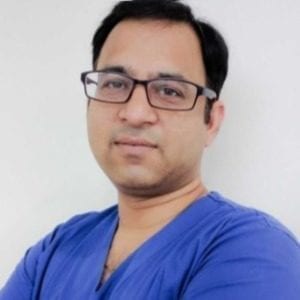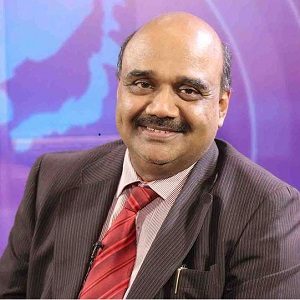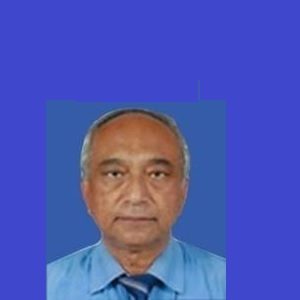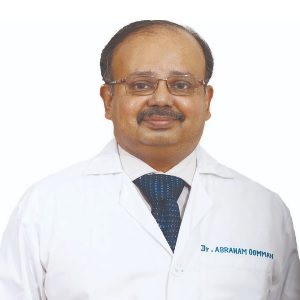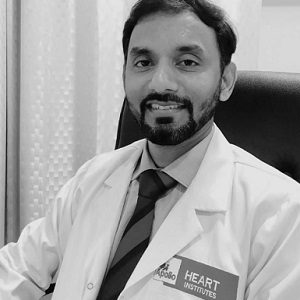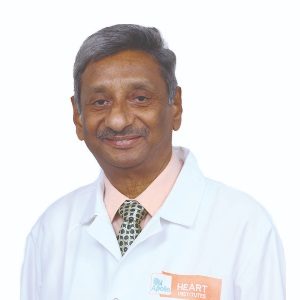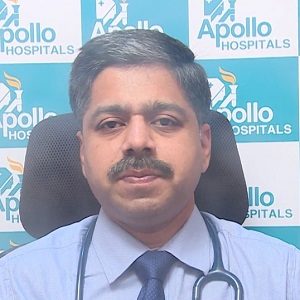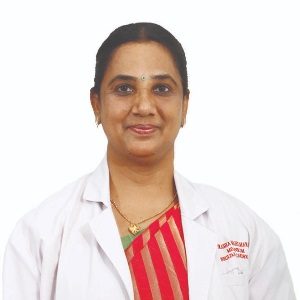Best Doctors in India for Cardiac Ablation
- Cardiologist, Gurugram, India
- Over 20 years’ experience
Profile Highlights:
- Dr. Hemant Madan is an experienced and accomplished cardiologist, with a professional experience of around 20 years.
- His expertise includes all aspects of cardiology, including pediatric cardiology, complex coronary interventions, device implantation, all kinds of rhythm disorders, percutaneous treatment of valve stenosis, and peripheral interventions.
- Dr. Madan pursued his Fellowship at the Royal College of Physicians from Edinburgh in UK.
- Cardiac Surgeon, Gurugram, India
- Over 15 years’ experience
Profile Highlights:
- Dr. Rachit Saxena is an experienced cardiac surgeon, who is known for his extreme dedication to his profession, and for providing absolute patient satisfaction.
- Supported by an efficient cardiac surgical team, Dr. Saxena is known for successfully managing the most complex of cardiac surgical problems.
- Dr. Rachit Saxena is known especially known for the capability to perform cardiac surgery with minimal blood requirement and ensure early mobilization and return to work.
- Cardiothoracic Surgeon, Chennai, India
- Over 25 years’ experience
Profile Highlights:
- Dr. T Sundar is one of the best cardiothoracic surgeons in India.
- He is having extensive exposure to critical heart diseases and he has operated on them successfully.
- Dr. T Sundar is a Senior Consultant at Apollo Hospitals since 2003.
- He has been associated with international standards of surgery and diagnosis since his education period.
- Cardiothoracic and Vascular Surgeon, New Delhi, India
- Over 36 years’ experience
Profile Highlights:
- Dr. N Sastri is a renowned cardiothoracic surgeon in India with extensive experience in critical heart surgeries.
- He has nearly 36 years of experience and is a senior consultant- Cardiothoracic & Vascular Surgery with Indraprastha Apollo Hospitals, New Delhi.
- Dr. Sastri specializes in the diagnosis and treatment of vascular disorders using advanced techniques. He has expertise in Total Anomalous Pulmonary Venous Connection Repair, Arterial and Ventricle Defects Surgery, Cardiac Resynchronization Therapy, Balloon Valvuloplasty, CABG LV restoration, PDA Device Closure, PPI, Valve Replacement, and Atrial Fibrillation Surgery.
- Over the years’ Dr. Sastri had treated patients across various countries. In addition to the adult and neonatal cardiac surgeries, he is involved in research and put out many research papers in different medical journals.
- Interventional Cardiologist, New Delhi, India
- Over 47 years experience
Profile Highlights:
- Dr. Prashanta Kumar Ghosh is a senior cardiologist at Indraprastha Apollo Hospital in New Delhi with experience of nearly 47 years in the field.
- Dr. Ghosh has expertise in testing and monitoring cardiac problems. The procedures mainly include minimally invasive cardiac surgery, implantations, device closure for congenital heart diseases, cardiac catheterization, Carotid Angioplasty, Stenting, etc. Half of his experience came from practicing non-invasive cardiology.
- He has so far performed nearly 3 lakh Echos as well as thousands of Doppler and Trans Esophageal Echos in his professional journey.
- Dr. Ghosh has participated in many studies and published papers in various conferences and journals. He also delivers lectures to the students of many institutions across India and abroad.
- Cardiologist, Chennai, India
- Over 31 years’ experience
Profile Highlights:
- Dr. Abraham Oomman is one of the best Cardiologists in Chennai, having an experience of 31 years in this field.
- Dr. Oomman offers consultation and also performs cardiac procedures. He specializes in Preventive Cardiology, Interventional Cardiology, Rheumatic Heart Disease, and Lipidology.
- Patients also visit him for ASD and VSD Surgery, Dextro-Transposition of the Great Arteries (DTGA), Minimally Invasive Cardiac Surgery, and Vascular Surgery.
- Cardiologist, Chennai, India
- Over 22 years’ experience
Profile Highlights:
- Dr. Refai is a world-renowned cardiologist who practices at Apollo Hospital in Greams Road, Chennai.
- Dr. Refai completed advanced training in the United Kingdom after finishing his medical degrees in India.
- He specializes in Angioplasty (Stent implantation), Implantable Cardioverter-Defibrillators (ICDS), Transradial Rotablation, Chronic Total Occlusion Angiography, Pacemaker, Cardiac Invasive Procedures, Bypass Surgery, and other cardiovascular procedures.
- He was involved in many TAVI-related studies at King’s College Hospital in London, and a heart failure pilot trial at The Essex.
- Interventional Cardiologist, Chennai, India
- Over 38 years’ experience
Profile Highlights:
- Dr. I Sathyamurthy is a veteran Cardiologist and has an experience of more than 38 years in Interventional Cardiology.
- Dr. Immaneni Sathyamurthy is a distinguished personality who bagged Padma Shri, the fourth-highest Indian civilian award. In addition to it, he was conferred many awards for his contribution to the medical sciences.
- He has over 250 publications to his credit, some of these are used as textbooks in medical courses.
- Interventional Cardiologist, Chennai, India
- Over 25 years’ experience
Profile Highlights:
- Dr. Karthigesan A M is a renowned Interventional Cardiologist with more than two decades of experience.
- He completed advanced training in cardiac arrhythmia in the USA to serve his patients in a better way.
- Dr. A M Karthigesan received several awards from prestigious associations for his contribution to the field.
- Dr. Karthigesan authored several research papers and articles in premier periodicals and presented papers at national conferences.
- Interventional Cardiologist, Chennai, India
- Over 32 years’ experience
Profile Highlights:
- Dr. Asha Mahilmaran is a seasoned Interventional Cardiologist in Chennai, with more than three decades of expertise in the sector.
- She excelled in academics and was awarded a gold medal in medicine and cardiology.
- Dr. Mahilmaran offers Ventricular Septal Defect Surgery, Cardioversion, Carotid Artery Disease, Chest Pain Treatment, Cardiac Ablation, and Dextro-Transposition of the Great Arteries (DTGA), etc.
- Over the years, she has performed over 15,000 preventive heart checkups.
Best Hospitals in India for Cardiac Ablation
Cardiac Ablation
Cardiac Ablation is a procedure that involves the use of energy for making small scars in the tissues of your heart. The energy stops unusual electrical signals that are moving through the heart and causing uneven heartbeat or arrhythmia. The procedure treats atrial fibrillation which is a type of irregular heartbeat. Your doctor will perform Cardiac Ablation if the medications and heartbeat resetting (also called cardioversion) fail to work.
Types of Cardiac Ablation
There are two ways of performing ablation. Catheter ablation is a more common one of the two. The other name for Cardiac Ablation is radiofrequency or pulmonary vein ablation. This isn’t a surgical procedure. Your doctor will put a catheter (a thin, flexible tube) into the blood vessels of your neck or leg to guide it to the heart. When the tube reaches the area causing arrhythmia, it will destroy the cells responsible for the same. This makes your heartbeats regular.
- Radiofrequency ablation– The doctor will send radiofrequency energy with the help of catheters to make circular scars around the veins or each group of veins.
- Cryoablation- The doctor will use a single catheter to send a balloon that has material tipped for freezing the tissues and cause a scar.
Types of cardiac surgical ablation : Surgical ablation will involve cutting your chest to gain access.
- Maze procedure- Your doctor will perform this while you are undergoing open-heart surgery for bypass or valve replacement. He or she will make small cuts in the upper portion of your heart while stitching them together to form a scar that stops unusual signals.
- Mini maze- In most cases, people with atrial fibrillation don’t require n heart surgery. Here the need for this procedure arises. Your doctor will make multiple cuts between the ribs while using a camera to perform catheter ablation.
- Convergent procedure- It involves catheter ablation with a mini-maze procedure.
Why it's done?
The procedure helps to correct the problems with heart rhythm. The electrical impulses causing the contraction of your heartbeats must follow a specific pathway through the heart. Arrhythmia or abnormal heartbeat happens due to an interruption in these impulses that are treatable with Cardiac Ablation. Cardiac Ablation is the right option for those who:
- Tried medications for arrhythmia but didn’t get any results
- Had serious side effects because of medications that treat arrhythmia
- Are at a high risk of complications due to arrhythmia
Benefits
Preparation
What to expect?
During the procedure
Your doctor will perform the procedure in the hospital. The nurse will place an IV line in your forearms before beginning the procedure and give you a sedative so that you relax. Your doctor might use general anesthesia instead to make you fall asleep. Your doctor will numb the area near your neck, groin, or forearm after the effects of the sedative set in. The team will then insert a needle into your vein while placing a sheath through this needle.
This is followed by threading the catheters through your sheath and guiding them to various places in your heart. Next, they will inject a dye into the catheter that allows your doctors to see the blood vessels and heart using x-ray imaging. Electrodes are present at the tip of the catheters that help to send electrical impulses to your heart and record the electrical activities of your heart. This process involving tests and imaging for determining the cause of arrhythmia is known as electrophysiology study (EP study). The doctors perform this before Cardiac Ablation to check the most effective way of treating arrhythmia.
Upon identifying the abnormal heart tissue responsible for causing heart arrhythmia, your doctor will direct the catheter tips towards the abnormal tissue of your heart. The catheter tips will allow the energy to create scars and destroy the tissue causing the arrhythmia. Ablation might block electrical signals traveling through the heart so that the abnormal rhythm stops while allowing signals to travel in a normal pathway. The procedure takes around 4 to 5 hours but it may take longer if the procedure is complex.
After the procedure
The nurse will move you to a recovery area so that you can rest quietly for 5 to 6 hours and there is no bleeding at the catheter site. The team will monitor your heartbeat and blood pressure to check if there are any complications. You can go back home on the same day as the procedure if you are in a good condition. However, you may need to stay overnight if your case is complex. Although you may experience soreness, it will hardly last a week. You will also be able to perform routine activities after some days of the procedure.
Results
Risks
The risks associate with Cardiac Ablation are:
- Bleeding on the site of insertion of a catheter
- Infection
- Arrhythmia due to damage to the electrical system of your heart
- Damage to your heart
- Narrowing of the veins present between the heart and the lungs
- Radiation
- Damaged heart valves
- Damage to the blood vessels due to scraping
- Radiation
- Heart attack
- Blood clots in your lungs or legs
- Kidney damage because of the dye
- Stroke
- Death

